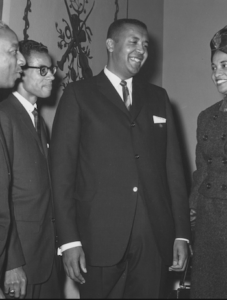
Aloysius Higginbotham, 1969
*On this date, 1928, A. L. Higginbotham Jr. was born. He was a Black federal judge, scholar, and civil rights advocate.
Born and raised in segregated Trenton, New Jersey, A (loysius) Leon Higginbotham Jr. attended Purdue University in Indiana to study engineering. There, Higginbotham objected to the segregated conditions for African Americans, particularly the unheated attic space that served as the dormitory for Black students. Convinced by the university president that Purdue intended to remain segregated, Higginbotham transferred to Antioch College in Ohio, graduating with a B.A. degree in 1949. He entered Yale Law School in 1950.
That same year, he witnessed future Supreme Court Justice Thurgood Marshall argue the landmark Sweatt v. Painter school desegregation case, which inspired Higginbotham to use the courts to advance the rights of minorities. After graduating from Yale in 1952, Higginbotham worked in private practice and as an assistant district attorney in Philadelphia, Pennsylvania. He also served as president of the local branch of the National Association for the Advancement of Colored People (NAACP).
President John F. Kennedy appointed him to the Federal Trade Commission in 1962, making Higginbotham the first African American and youngest person to serve as a commissioner of a federal regulatory commission. President Lyndon B. Johnson appointed him to a federal district court judge. President Jimmy Carter elevated him to the Federal Court of Appeals in Philadelphia in 1977, and in 1989, Higginbotham became the chief judge of that court. During his time on the bench, Higginbotham earned a reputation as a liberal jurist who believed that the law could be used to institute social justice for non-whites.
Often referring to himself as a “survivor of segregation,” Higginbotham grew increasingly opposed to the conservative trend in U.S. politics during the 1980s and 1990s, which he believed reversed many of the gains made during the Civil Rights Movement of the 1950s and 1960s. In response to this trend, he retired from the bench in 1993, stating that he sought to narrowly focus his legal practice and scholarly publishing on a few key social issues, including racism and the plight of the disadvantaged. He began teaching at Harvard University and practicing law in New York and Washington, D.C. In 1995, President Bill Clinton awarded him the nation’s highest civilian honor, the Presidential Medal of Freedom, and in 1996, he received the NAACP’s Spingarn Medal.
Higginbotham continued to write, often criticizing conservative policies that led to scaled-back social services and sought to eliminate affirmative action programs in education and employment. For Higginbotham, the symbol of this conservative trend was Clarence Thomas's appointment in 1991 to the Supreme Court seat that Thurgood Marshall had vacated. In response, Higginbotham made a public objection, both to Thomas’s appointment to the Supreme Court and later to his appearance as a speaker at the convention of the National Bar Association.
In addition to publishing more than 100 scholarly legal articles, Higginbotham undertook a four-volume series of books on race and American law. By December 1998, he had completed two volumes of the series, In the Matter of Color (1978) and Shades of Freedom (1996). A. L. Higginbotham Jr. died on December 14, 1998.
African Americans/Voices of Triumph
by Dr. Henry Louis Gates Jr.
Copyright 1993, TimeLife Inc.